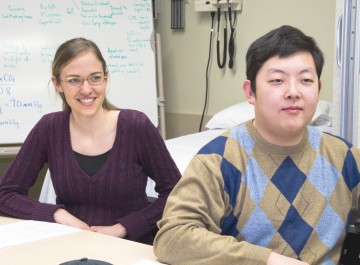 Melissa Carr, Communications Coordinator – VFMP
Melissa Carr, Communications Coordinator – VFMP
While grabbing a quick bite to eat, Jessica McCallum and her colleagues discuss the life cycle of HIV, which they learned about in a recent lecture. The group banters back and forth enthusiastically. They share experiences they have had with preceptors and patients, as well as topics covered in their clinical skills labs. The sense of camaraderie amongst the group is apparent. In an intimidating and demanding hospital environment, these first year medical students are very much at home.
Since January, 2013, the UBC Faculty of Medicine MD Undergraduate Program has been piloting an Academic Learning Community (ALC) in New Westminster at Royal Columbian Hospital. An ALC is a place for students to connect with patients, preceptors and the surrounding community in a contextualized learning environment.
Currently, seven first year medical students are participating in the pilot, with two clinician advisors overseeing the group. All aspects of their learning (i.e. lectures, problem-based learning, and clinical skills) are covered on-site at Royal Columbian Hospital. Experiential learning takes place at various Family Practice offices in the community.
ALCs provide great benefit to both students and communities, says Dr. Jill McEwen, assistant dean, undergraduate education, Fraser. Students are exposed to patients early in their studies. This hands-on, tangible experience allows for deeper understanding of the academic materials by giving clinical context to foundational science learning. Further, working with the same group for an extended period of time fosters strong connections amongst students and preceptors. Students also benefit from working in small, collaborative groups.
“So far we are extremely pleased with the outcomes of the pilot ALC at Royal Columbian Hospital,” says Dr. McEwen. “The participating students are very happy with their experience, telling us they enjoy the small peer group and the connections they have made with their clinician supervisors, hospital staff and the New Westminster community.”
Jessica agrees.
“Being part of an ALC has provided me with the opportunity to learn how to work with a smaller team and how to problem solve and support each other. ALCs allow for integration into a hospital community that I would not otherwise experience…we have received more clinical exposure, which puts our theoretical knowledge into perspective.”
The Fraser region also stands to gain from having the ALC at Royal Columbian. Medical student integration into the community will result in a greater understanding of the health challenges and needs faced by the region’s diverse population. It has also been shown that doctors are more likely to practice in communities they train in. The hope is that these students will eventually become the physicians who serve New Westminster and beyond. There are plans underway to continue the Royal Columbian Hospital pilot ALC for second year students, and to have similar pilot ALCs implemented throughout the Vancouver-Fraser region in 2014, including a cohort based at Surrey Memorial Hospital. Eventually, as part of the renewed MD curriculum, the aim is for province-wide Academic Learning Communities.
Jessica and her fellow students are excited to continue their undergraduate learning as part of the ALC.
“The experiences I’ve had observing physicians and surgeons are helping me decide what fields of medicine I am interested in. It has been wonderful.”
Comments are closed, but trackbacks and pingbacks are open.